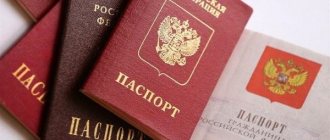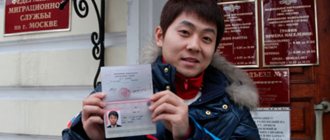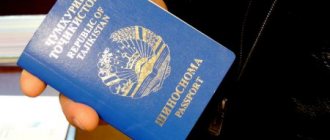Entry into Russia remains closed for citizens of Tajikistan. And closed from March 2021 . Many Tajik migrants are looking for an opportunity to enter Russia illegally. Such cases have become more frequent recently.
We, together with experts from the Center for Human Rights and human rights activists working in the field of migration, decided to once again clarify who has the right to enter Russia and who does not.
Recently, cases have become more frequent when passengers from Tajikistan who arrived on charter flights to Russia are not allowed out of airports. People lose money and time to get to the “promised land”, and having entered there, they are forced to take a return ticket and return.
The Center for Human Rights (CHR) notes that this is all happening due to the fact that, wanting to get to Russia in any way, people resort to various tricks. One of them is falsification of medical certificates.
We talked earlier about which category of citizens of Tajikistan has the right to travel to Russia and you can read more about this here.
Kept at the airport for two weeks
As the Central Human Rights Center said, on January 7 they learned that in one of the terminals of Moscow Sheremetyevo airport there were citizens of Tajikistan who were not allowed into Russia because of false medical certificates.
They arrived in Moscow on December 29, 2021 on a charter flight Bokhtar-Moscow air. Upon arrival at the airport, more than 20 people were found to have violations in their entry documents.
At the time of preparation of this material, 7 people had already returned through Osh (Kyrgyzstan) to Tajikistan, and another 17 citizens were sent home on January 14. Among them were two women and a one and a half year old child.
“Tajiks stuck at the airport were forced to sleep on benches in the airport terminal; they were left without basic hygiene conditions and timely hot food. Airline representatives only occasionally fed them. The customs service at Sheremetyevo reported that these individuals were not deported or expelled by court order, as is usually the case, because no visible violations were detected on their part. They were taken back to Tajikistan. Unfortunately, this is not an isolated case,” notes CHR representative Dilnoza Kuddusova.
Muhammad Sobirov, a lawyer and activist of the Tong Jahoni organization in Moscow, also speaks about the increasing number of cases of violation of requirements for crossing the Russian border.
According to him, in recent months there have been many requests from citizens. Most of the calls are from Tajikistan, when people are consulting on how they can come.
According to the order of the Government of the Russian Federation No. 635 of March 16, 2020, the Russian Federation has closed entry into its territory for foreign citizens, including citizens of the Republic of Tajikistan. Currently, only a few categories of citizens have grounds for entry.
“About a week ago, more than 100 people were returned to Tajikistan, who flew to Russia without any reason and were not allowed into Russian territory by the border service of one of the airports. But many of them spent a lot of money trying to enter Russia: some got into debt or took out a bank loan,” says Sobirov.
Meanwhile, schemes are beginning to flourish in Tajikistan, according to which they are trying to send Tajik citizens to Russia.
Lawyers at the advisory office in Khujand, Azalkhon Alimov and Sayfullo Ergashev, say that the number of requests from citizens regarding entry into Russia is increasing and they have noticed how the demand for the so-called visa is growing.
For a “joke” about coronavirus, a migrant from Tajikistan spent the entire pandemic in Butyrka
The funny guy in the video is called Karomatullo Jaborov.
Photo: Instagram.com
— Coronavirus is here! Come out quickly! Hurry up! - a rough bass roars off-screen.
A young man in a mask collapses on the floor of a subway car. His body is shaken by convulsions. The passengers are confused and scatter. When the train arrives at the Ulitsa 1905 station, the train instantly empties.
A prank in the Moscow metro thundered throughout the country.
Photo: Instagram.com
While there is panic on the platform, the main character of the video quickly runs out of the subway. The footage was taken in early February 2021. At that time, Moscow knew about Covid only from the news. Not a single case of the disease was recorded in the capital. Everything was just beginning.
Komsomolskaya Pravda found out that because of his prank, the hero of the video was never able to find out what kind of blow the pandemic dealt to the capital. A few days after the video, he was detained and accused of hooliganism. Since then the guy has been in jail.
The funny guy in the video is called Karomatullo Jaborov . He is 26 years old. Originally from Tajikistan, a couple of years ago he moved to Moscow and started blogging. He uploaded videos to his Instagram and YouTube. His pranks received nearly 100 thousand views: a good result, but far from the top for these social networks.
The pranker has been in pre-trial detention for more than a year.
Photo: Instagram.com
And Kara’s humor—as the pranker called himself for short—is of a low caliber.
Either he asks people in a shopping center when Chechnya will become part of Russia, or he waves a bag of nasvay while sitting on the toilet. He stuffed carrots into his pants and walked around the supermarket with his codpiece sticking out. In general, you won't want to laugh.
In the description of the video, the blogger constantly emphasized that the video would bomb and blow up the network. The only thing that really hit home was the prank in the subway car. But we won’t know how many views the video received. Before his arrest, Kara deleted it.
Kara loved to do pranks in shopping malls.
Photo: Instagram.com
A case was opened about hooliganism committed by a group of people. Two comrades helped organize the prank in the Karomatullo metro. They were released on their own recognizance. Kara went to pre-trial detention center-2, popularly known as Butyrka. At the trial for choosing a preventive measure, he said:
- I'm sorry, it's just a stupid joke. I want to ask people for forgiveness.
He explained that he wanted to draw attention to the problem in such a non-trivial way.
Kara is married and has a one-year-old child.
Photo: Instagram.com
Kara is married and has a one-year-old child. Elderly parents at home. Friends tried to fight for the guy, creating a fuss on social networks. They promoted the hashtag #freedomtokarrapranku, but Kara’s story did not evoke sympathy from other bloggers. The virtual flash mob didn't work.
Roman Shakhmanov told KP . - I compensated the metro for material damage - about 30 thousand rubles (for the delay of the train due to the panic of passengers - author's note). He has been in pre-trial detention for more than a year. The case was supposed to be considered in court in February, but the materials were returned to the prosecutor's office - there was a technical error in the documents. The case is unprecedented: there is little danger to the public, and the person is being held in custody for such a long time. Meanwhile, the pranker and his accomplices face up to seven years in prison.
Can I enter by invitation for treatment?
One of the reasons for entering Russia is undergoing treatment. For these purposes, it is necessary to present an invitation for treatment from a medical institution. Many people take advantage of this and make fake certificates and invitations.
You may be allowed on flights if you present valid documents issued by a medical organization confirming an invitation for treatment indicating the time of treatment or documents (copies of documents) issued by the Russian Ministry of Health.
However, it is quite possible that your foundation will also be thoroughly checked at the border checkpoint. If your certificate is not confirmed or it is discovered that you have falsified documents for treatment, then in this case you will not be allowed through, but will be sent back on the next flight. The money spent on the flight will not be returned to you.
“We were approached by a citizen of Tajikistan who had such an invitation. According to him, he really is sick and went out for treatment. He flew to Russia on Sunday night and during the border control check, having contacted the medical institution, he did not receive confirmation from the doctor on duty. Since such information was clarified with the chief doctor, and he was supposed to go to work only on Monday, border control did not let the patient through and sent him back to Tajikistan,” says lawyer Azalkhon Alimov.
Therefore, according to Alimov, there is no clear answer to the invitation to treatment. And now many people are trying to forge medical documents, and therefore this basis is strictly checked.
Lawyer Muhammad Sobirov warns his compatriots that even if you were allowed through at the border with an invitation and a medical certificate and you entered the territory of the Russian Federation, you will no longer be able to apply for a job based on the certificate.
“Moreover, you must be in that medical institution, and the institution itself is obliged to register you for the period specified in your invitation and inform the authorized authorities. Coming by invitation, but then going to work is considered a violation of the legislation of the host country, and if a violation is detected, the citizen will be immediately deported to his homeland,” he notes.
Will Russia accept “extra Tajiks”
There is no need to think long about why Prime Minister of Tajikistan Kohir Rasulzoda met in Moscow with Deputy Prime Minister of the Russian Federation Alexei Overchuk. President of the Republic of Tajikistan Emomali Rahmon recently stated that last year, due to the closure of borders due to the coronavirus pandemic, 80% of Tajik migrants were unable to leave for work—Russia was especially singled out in this regard. More than 1 million Tajiks work in Moscow and the regions of the Russian Federation, engaged in construction work, agriculture and the housing and communal services system. Before the pandemic, they sent home about $3 billion a year, but 2020 was a disaster: remittances dropped by more than half. Meanwhile, they are the most important source of income not only for many ordinary families, but also for replenishing the GDP of all of Tajikistan.
In order to at least partially resolve the issue of getting rid of “extra people,” that is, employing Tajiks in Russia according to the “old model,” Moscow must open regular flights with Dushanbe, and this was the main topic of Rasulzoda’s negotiations with the Russian authorities, who have an ambivalent position . On the one hand, finding Tajik migrants - the most unpretentious and law-abiding - has already become critically important for many industries, on the other hand, Rahmon needs to make it clear that if Tajikistan joins the Eurasian Economic Union, which he is in no hurry to do, the issue of the return of migrants will be much resolved faster. In addition, Tajik migrants would enjoy significant socio-economic preferences in the EAEU area, including Russia.
The solution to the issue of resuming air traffic “at once” seems to be stuck for now. Meanwhile, requests for labor are officially coming from Russia to Tajikistan. And now the problem comes down to the opening of the sky, which Dushanbe has been asking Moscow for since last summer - it accounted for 70% of the total passenger traffic of the Republic of Tatarstan.
3619
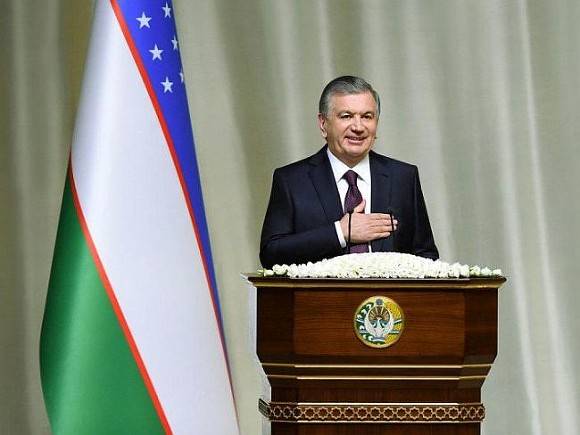
Why is Mirziyoyev being “crowned” ahead of time?
It was hard not only for migrant workers and their Russian employers, but also for Tajik students studying at universities in the Russian Federation - there are more than 29 thousand of them. How the issue of continuing their full-time education will be resolved is also unknown.
During the visit of the Tajik Prime Minister to Moscow, the problem of expanding economic ties and industrial cooperation was also raised. Dushanbe is striving to create joint ventures on the basis of its existing production facilities and in the territory of free economic zones. So far, Moscow seems to have limited itself to its readiness to expand the range of supplies of agricultural products and has expressed the interest of its IT companies in establishing contacts with Tajikistan - they have specific proposals regarding digital distance learning and telemedicine. In addition, Dushanbe was invited to join the “Travel without COVID-19” application to allow citizens of the republic to enter the territory of the Russian Federation.
But here is a “not blurred”, quite concrete agreement: this summer Russia will begin construction of five Russian schools in Tajikistan. Sites for their construction have been allocated in Dushanbe, Kulyab, Khujand, Bokhtar and Tursunzade. The educational process in them will begin in 2022, and according to Russian standards. Since the need for labor migration in the republic will not soon disappear, this is good news for Tajiks. They will be able to get a “cleaner” job in the Russian Federation, and in terms of language communication and adaptation they will not have problems. And another, “wider” window of opportunity will open for them if the republic joins the EAEU.
Question: why is the demand for migrant workers so high in vast Russia? Is it just because Russians disdain hard work, seasonal agricultural work under the scorching sun, and even construction work in the cold, to which migrants seem to be unaccustomed? Of course, there is also the factor of cheap labor and the unpretentiousness of “outsiders”, who until recently were completely powerless, but the situation has been somewhat changed for the better by new rules for labor migrants from the EAEU states.
42157
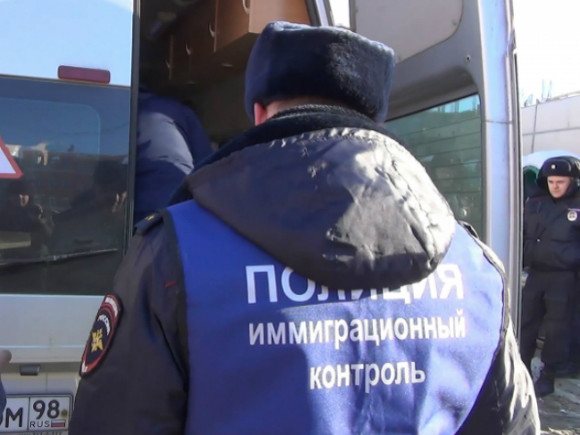
Why did the Armenians rush to this “damned Russia”?
Although the “in large numbers” irritate many, the pandemic and the shortage of workers in the Russian labor market have shown that without them it has become extremely difficult for the construction sector, the agricultural sector, and the housing and communal services sector. It is enough to look at the snow-covered streets of Russian cities to appreciate the hard work of migrants, which was somehow not visible before the pandemic. Now those who came in large numbers are willingly called back. Moreover, the Russian government has instructed a number of line ministries to work on the issue of attracting foreign citizens to at least seasonal agricultural and construction work in various regions of the country.
Meanwhile, labor migration is a fairly common phenomenon; it is not a “phenomenon” of the post-Soviet space. Almost all rich and developed countries need migrant workers. It is no coincidence that during the coronavirus pandemic, many of them opened their borders to seasonal workers, and even introduced certain privileges for them. It seems that Russia will follow the same path if it abandons excessive politicization of the issue.
As Leonid Kholod, Doctor of Economics, former Deputy Minister of Agriculture of the Russian Federation, told the Sputnik portal, vegetable and fruit growing are those areas where there is a peak need for temporary labor. In the USSR, he recalled, this issue was resolved with the help of students, and after the collapse of the Union, they were replaced by labor migrants. According to him, many of them have generic skills suitable for agriculture. The labor shortage, Kholod is convinced, can only be solved by the resumption of regular flights.
Interesting data was published by Bloomberg. According to his analysts, the shortage of migrant workers threatens Russia with an annual reduction in potential GDP growth of 25 basis points over 10 years. They also predict a shrinking workforce over the long term. It is noted that due to the shortage of migrants, many Russian enterprises, in particular construction ones, had to increase wages in order to attract workers to construction sites, but this measure did not give the desired effect - the vacancies are empty.
6875
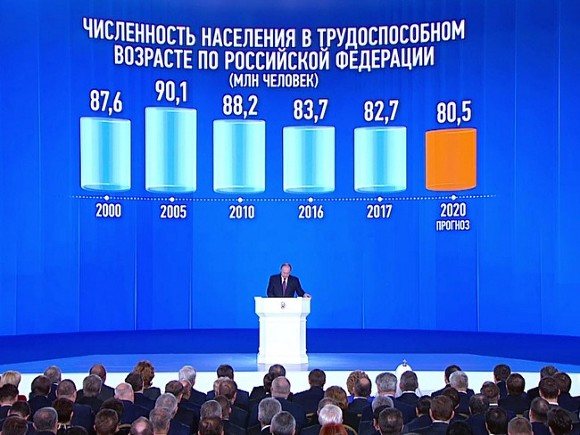
Migrants cannot be left behind
According to Bloomberg, mass vaccination in the Central Asian republics could help fill the shortage of migrant workers in Russia, but many of them still do not have access to vaccines.
If we talk about Tajikistan, whose president almost swears that since January of this year not a single case of COVID-19 has been recorded in the republic, the World Bank two days ago approved the allocation of additional funding to the republic in the amount of $8.63 million as part of the project emergency response to the threat of the coronavirus pandemic. This money is intended for the purchase and delivery of “internationally approved” vaccines to the Republic of Tajikistan.
Let us note that the population of Tajikistan is close to 9.5 million, which is considered a critical indicator for this republic. Rosbalt has already written that the World Bank recommended that it limit the birth rate, since such a high population for a country, 93% of whose territory is occupied by mountains, is “unbearable” for its resources. In large cities, people are careful not to “create poverty,” but in rural areas, 8-10 children per family is the norm.
Continuing the topic of vaccination. The WB program is focused on vaccinating priority populations and preparing affected facilities for larger immunization efforts once additional COVID-19 vaccines become available. But for now there is no need to say that the majority of the population of Tajikistan will soon be vaccinated against “corona.” Although the Ministry of Health of the Republic previously announced a rather ambitious plan - vaccination of 6.7 million people, of which 5.8 million with Russian-made drugs. The rest will receive other vaccines through the COVAX program.
The faster the population of Tajikistan is vaccinated, the sooner, in theory, the outflow of workers from the republic to Russia and other countries should begin. But the questions of when the Russian Federation will let in Tajik migrants in the same numbers, and what are the plans for opening regular flights, still remain unanswered. And spring agricultural work is already around the corner. And other areas are in a protracted wait for “hard workers”.
Irina Jorbenadze
Can I enter Russia through Belarus?
Now one of the possible transit corridors has become the border of Belarus with Russia. Such an attempt to enter the territory of Russia is a violation of Article 322 of the Criminal Code of the Russian Federation “Illegal crossing of the border of the Russian Federation” and is punishable by “a fine of up to 300 thousand rubles, or forced labor for up to four years, or imprisonment for the same period.”
“But I know of cases where someone who crossed the border in this way, and then filed a patent and started working. But all this is illegal. If such situations are identified, violators face lifelong deportation with a heavy fine or even criminal punishment,” the lawyer warns.
Unfortunately, according to him, in conditions of closed borders this method has become popular and there have been several such cases.
According to the Tong Jahoni organization, 3,800 people were detained on the border with Belarus, all of them from Central Asia. At the moment, criminal cases have been initiated against 339 people. They face imprisonment or lifelong deportation.
Can I enter Russia through third countries?
Russia has officially opened its borders to some countries, including Turkey, India, Kazakhstan, Kyrgyzstan, and the UAE.
Flights to Turkey, Dubai and India from Tajikistan are open and many are wondering if they can get to Russia through these countries? We remind you once again that if you are a citizen of Russia, then you can. In other cases, there are reservations that need to be read in detail.
More often, those who want to get to Russia from Tajikistan consider the route through Kyrgyzstan.
If you are a citizen of Tajikistan, live in another country, for example, in Kyrgyzstan, and want to fly to Russia, you must have a valid residence permit for the country where you live.
Tajikistan is again knocking on the Kremlin’s door, trying to achieve the restoration of transport links interrupted by the coronavirus pandemic.
However, Russia is in no hurry and may be trying to seize the moment to pressure Tajikistan to consider membership in the Moscow-led Eurasian Economic Union (EAEU).
Prime Minister of the Republic of Tajikistan Kohir Rasulzoda visited Moscow this week in order to make life easier for migrant workers - both those who are already in Russia and those who want to go there. However, the official agenda was broader.
On February 8-9, officials from the two countries gathered for the 17th meeting of the Intergovernmental Commission on Economic Cooperation. The main topic of the negotiations was supposedly expanding access to the Russian market for Tajik agricultural products.
But another topic was clearly hanging heavily in the air - COVID-19, as indicated by one key line in the Tajik Foreign Ministry’s report on the negotiations.
“Taking into account the improvement in the sanitary and epidemiological situation in Tajikistan, the Russian side was invited to consider the issue of resuming air traffic between the countries as soon as possible,” the document says.
Tajikistan has declared a decisive and final victory over the coronavirus. Moreover, victory was achieved suspiciously quickly. While health authorities typically reported about 30 new cases per day in December (and even that number was almost certainly a gross underestimate), the figure has typically been zero since January 1st. These statements make it difficult to believe that it is possible to understand what is happening.
Victory over COVID-19 was announced in a televised New Year's address by President Emomali Rahmon, who boasted that “the coronavirus has almost disappeared in our country.” The speech was followed by changes to daily reports of new cases to reflect this new reality.
The Tajik government's desperate efforts to convince people that the health crisis is over have one important target: Russia. Remittances from migrant workers are typically equivalent to about a third of a country's GDP. But in 2021, the pandemic dealt a blow to this pillar of the Tajik economy.
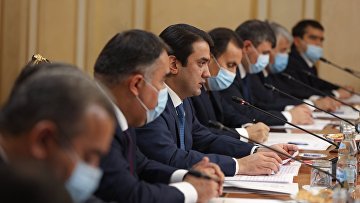
EurasiaNet 11/27/2020 EurasiaNet 09/03/2020 EurasiaNet 06/10/2020 According to the Central Bank of the Russian Federation, in the first three quarters of last year, $1.2 billion was transferred from Russia to Tajikistan, which is 37 percent less than during the same period in 2021. Meanwhile, the Tajik central bank said the drop was not as dramatic, but its data appeared to be as useful and credible as the Ministry of Health data.
The reception that Rasulzoda received in Moscow gives little hope for an improvement in the situation. He met only with Russian Deputy Prime Minister Alexei Overchuk, and only second-rate representatives of Russian ministries attended the intergovernmental meeting.
In addition, Moscow does not take Dushanbe’s claims of victory over COVID-19 at face value. The Russian government announced that a delegation from Rospotrebnadzor will visit Tajikistan to assess the epidemiological situation in the country. Exactly when this will happen has not yet been announced.
Russia's actions on the issue of resuming flights do not inspire much hope either. Transport connections with countries such as Kazakhstan, Kyrgyzstan and Belarus have more or less returned to normal, although the situation with coronavirus in these states is far from ideal. But Tajikistan was denied such a privilege, and this is hardly an accident.
The difference between Tajikistan and these countries is that the latter are members of the EAEU.
Pro-Kremlin media transparently hint that by eliminating this difference, Dushanbe will be able to avoid inconvenience in the present and future.
State news portal Sputnik, for example, quoted one Yuri Shurygin, head of the Moscow-based Association of Small and Medium Exporters, as saying that joining the EAEU would open a “big window of opportunity” for Tajikistan.
This is mentioned in more detail in an article by Nezavisimaya Gazeta, which also claims that Dushanbe is trying to delay the process as much as possible in order to “bargain the most preferential conditions for Tajikistan when joining the EAEU.”
Tajikistan finds itself in the unenviable position of having to choose between two unpleasant options: either allow itself to be locked into a trade bloc for which it is not enthusiastic, or watch Tajik migrant workers continue to endure endless hardships and humiliations.
InoSMI materials contain assessments exclusively of foreign media and do not reflect the position of the InoSMI editorial staff.
Can I enter Russia if I have a job offer?
The last paragraph of the Order of the Government of the Russian Federation No. 635 dated March 16, 2021, talks in detail about those who are considered highly qualified specialists.
By the way, the salary of such people should be more than 2 million rubles per year. That is, again, for this you must be a highly specialized specialist . And labor migrants from Central Asia mostly go to work on construction sites. And the same construction companies do not have the authority to send an invitation to work. In other words, such invitations for workers do not exist.
It was previously reported that the governments of Tajikistan and Russia are considering the issue of an organized recruitment of citizens and sending them to certain Russian enterprises, but this issue is still under consideration and has not been resolved.

